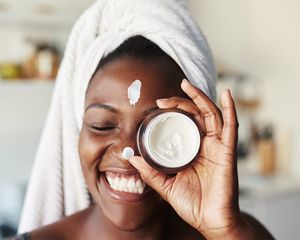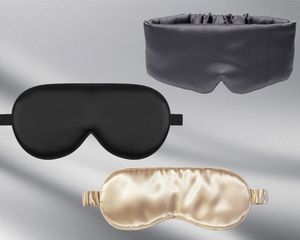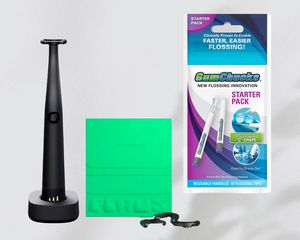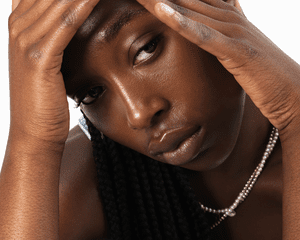:max_bytes(150000):strip_icc()/bcperiods_recirc-0c05bf9106dc43ac852951704ea0d4d7.jpg)
Getty Images
Birth control comes with a long list of symptoms and side effects, many of which often subside once the body acclimates to the synthetic hormones. Most of these experiences have become widely known through personal trials or anecdotal stories shared between friends. One thing that remains gray is what exactly happens after birth control. Any quick search will reveal the sheer number of people trying to navigate life after they stop taking the pill and are surprised to find that their period doesn't come back right away, sometimes for months. This isn't everyone's story, of course. Some bounce right back and begin ovulating again. But a large number of individuals are caught off guard by what is technically called secondary amenorrhea, or not getting a period for three months or more after having had one previously.
There's lots of advice floating around social media on "getting your period back," but we prefer a more old-fashioned approach to finding answers to health questions. We asked Stephanie McClellan, MD, and Alyssa Dweck, MD, FACOG, what happens after going off birth control and how to navigate getting your period back on schedule.
Meet the Expert
- Stephanie McClellan, MD, is a board-certified OBGYN and the chief medical officer and director of well-being at the Tia Clinic.
- Alyssa Dweck, MD, FACOG, is a practicing gynecologist and the co-host of the "Business of the V" podcast.
Keep scrolling to learn how to deal with late periods after going off birth control.
How Going Off Birth Control Affects Your Period
When you've been on the pill for years and years, your body understandably needs time to adjust to a new normal. So if you don't get your period back immediately after quitting hormonal birth control, try not to worry. "In many cases, menstrual habits revert to what they were before starting the pill," says Dweck. "In addition, many of the symptoms being treated by the pill i.e. cramps, PMS, acne, heavy or irregular bleeding may also return."
But it's important to note that no period doesn't mean no pregnancy. "If your period does not return immediately, you have no way of knowing when you are ovulating," explains McClellan. "Some women get pregnant after stopping the pill without experiencing a menstrual period because of unrecognized ovulation and inadequate or no contraception. Make sure to take a pregnancy test if you have any symptoms or think you might be pregnant."
What to Expect After Going Off Birth Control
Menstrual cycles are largely governed by the body's natural hormone production. Fluctuations in hormone production produce the physical, mental, and emotional changes many of us experience with each cyclical stage. Hormonal birth control manages this cycle by introducing hormones to suppress those already found in the body. Once you go off birth control, the external hormones will no longer be present, allowing the body to revert to its natural state.
As we mentioned, this isn't an immediate response but rather a slow tapering back into the body's new normal. Most periods start after the first month but, as hormones regulate, the body's natural rhythms will ebb and flow, causing variation in the frequency, duration, volume, and painfulness of each successive period. Irregularity in PMS symptoms, libido, water retention, weight, and skin balance are also common.
Is Having a Late Period After Going Off Birth Control Normal?
"Typically, it is reasonable to wait three months for the return of menses before intervening," says Dweck.
While a late period after going off the pill isn't unusual, Dweck says you should always consider pregnancy if there is a delay in the return of menses. She notes that the absence of menses can be accompanied by other symptoms such as acne, appetite change, breast leakage, headache or visual change, or other symptoms suggestive of pregnancy, thyroid disorder, PCOS, or other hormone imbalance.
When Will Regular Periods Resume After Going Off Birth Control?
According to Dweck, regular periods should return within two to three months tops (but usually occur sooner). If you have an irregular cycle, this time window may not be suitable. There are instances where progesterone may be needed to induce a period—but again, always check for pregnancy first, she says.
How to Get Your Period Back After Going Off Birth Control
If your period doesn’t come back after three months, it's important to let your doctor know. They can run a few tests to see if you have any underlying medical conditions that birth control may have been masking. "Chronic stress, thyroid disorders, profound and chronic Vitamin D deficiency, PCOS, rapid weight loss, length of time of pill use, menstrual history before starting the pill, and female athlete triad are just a few things that need to be considered when secondary amenorrhea occurs after stopping oral contraceptive use," McClellan says. If an underlying health issue is discovered, your doctor can walk you through steps for treating it, which could be as minor as taking a supplement or working on a higher daily caloric intake.
If everything comes back negative, though, McClellan recommends taking an integrative approach to getting your period back. While everyone is different, trying a combination of lifestyle adjustments can do the trick: "This involves strong gut health, adequate sleep, acupuncture, some form of mindfulness, and—particularly important—regular and high-quality social interactions.”
According to McClellan, combining these interventions can alleviate the inflammatory and metabolic burdens that our minds and bodies experience from the demands of our daily lives. "The result is balanced communication throughout our entire brain and body, including the pathways that can lead to ovulation and regular periods."
When to See a Doctor
If menses are absent for three months or any other symptoms mentioned above occur, worsen, or persist, it is best to check in with your gynecologist. Again, check for pregnancy if indicated.
The Final Takeaway
If you're struggling to get your period back after going off birth control, it's important to remember that you are not alone. But do watch out for some lifestyle factors that can make ovulation and menstruation more difficult for the body to achieve: "Chronic stress, inadequate caloric intake, excessive exercise, and social isolation are just a few," McClellan says. With a little help from your doctor, you can devise a plan to restore the ovulation process sooner rather than later.




